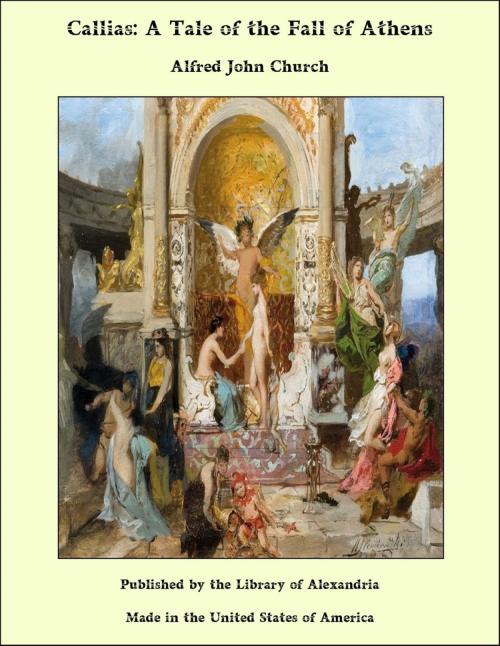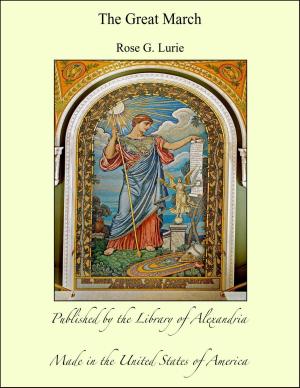Callias: A Tale of the Fall of Athens
Nonfiction, Religion & Spirituality, New Age, History, Fiction & Literature| Author: | Alfred John Church | ISBN: | 9781465610829 |
| Publisher: | Library of Alexandria | Publication: | March 8, 2015 |
| Imprint: | Language: | English |
| Author: | Alfred John Church |
| ISBN: | 9781465610829 |
| Publisher: | Library of Alexandria |
| Publication: | March 8, 2015 |
| Imprint: | |
| Language: | English |
It is the second year of the ninety-third Olympiad and the Theatre at Athens is full, for the great dramatic season is at its height, and to-day there is to be performed a new play by Aristophanes, the special favorite of the Athenian public. It is a brilliant scene, but a keen observer, who happened to see the same gathering some five and twenty years ago, must now notice a certain falling off in its splendor. For these five and twenty years have been years of war, and latterly, years of disaster. Eleven years ago, the City wild with the pride of power and wealth, embarked on the mad scheme of conquering Sicily, and lost the finest fleet and army that it ever possessed. Since then it has been a struggle for life with it, and year by year it has been growing weaker and weaker. This has told sadly on the glories of its great festivals. The furnishing of the stage, indeed, is as perfect as ever, and the building itself has been pushed on several stages towards completion. However scarce money may be in the public treasury, the theatre must not be starved. But elsewhere there are manifest signs of falling off. The strangers’ gallery is almost empty. All the Greek world from Massilia in Gaul to Cyrene among the sands of Africa used to throng it in happier days. Now more than half that world is hostile, and the rest has little to hope or fear from the dispossessed mistress of the seas. Dionysius of Syracuse, has sent an embassy, and the democracy, which once would have treated with scant courtesy the representatives of a tyrant, is fain to flatter so powerful a prince. There are some Persian Envoys too, for the Persians are still following their old game of playing off one great state against another. A few Greeks from Sinope and from one of the Italian cities, persons of no importance, who would hardly have found a place in the gallery during the palmy times of Athens, make up the company of visitors. Look at the body of the theatre, where the citizens sit, and the spectacle is deplorable indeed. The flower of Athens’ sons has perished, and their successors are puny and degenerate. Examine too the crowd that throngs the benches, and you will see that the slaves, distinguished by their unsleeved tunics, fill up no small portion of space. And boys form an unusually large proportion of the audience. Altogether the theatre is a dispiriting sight to a patriotic Athenian.
It is the second year of the ninety-third Olympiad and the Theatre at Athens is full, for the great dramatic season is at its height, and to-day there is to be performed a new play by Aristophanes, the special favorite of the Athenian public. It is a brilliant scene, but a keen observer, who happened to see the same gathering some five and twenty years ago, must now notice a certain falling off in its splendor. For these five and twenty years have been years of war, and latterly, years of disaster. Eleven years ago, the City wild with the pride of power and wealth, embarked on the mad scheme of conquering Sicily, and lost the finest fleet and army that it ever possessed. Since then it has been a struggle for life with it, and year by year it has been growing weaker and weaker. This has told sadly on the glories of its great festivals. The furnishing of the stage, indeed, is as perfect as ever, and the building itself has been pushed on several stages towards completion. However scarce money may be in the public treasury, the theatre must not be starved. But elsewhere there are manifest signs of falling off. The strangers’ gallery is almost empty. All the Greek world from Massilia in Gaul to Cyrene among the sands of Africa used to throng it in happier days. Now more than half that world is hostile, and the rest has little to hope or fear from the dispossessed mistress of the seas. Dionysius of Syracuse, has sent an embassy, and the democracy, which once would have treated with scant courtesy the representatives of a tyrant, is fain to flatter so powerful a prince. There are some Persian Envoys too, for the Persians are still following their old game of playing off one great state against another. A few Greeks from Sinope and from one of the Italian cities, persons of no importance, who would hardly have found a place in the gallery during the palmy times of Athens, make up the company of visitors. Look at the body of the theatre, where the citizens sit, and the spectacle is deplorable indeed. The flower of Athens’ sons has perished, and their successors are puny and degenerate. Examine too the crowd that throngs the benches, and you will see that the slaves, distinguished by their unsleeved tunics, fill up no small portion of space. And boys form an unusually large proportion of the audience. Altogether the theatre is a dispiriting sight to a patriotic Athenian.















